Last year for the International Day for Elimination of Racial Discrimination, and in collaboration with Elimin8hate, I drew this infographic:
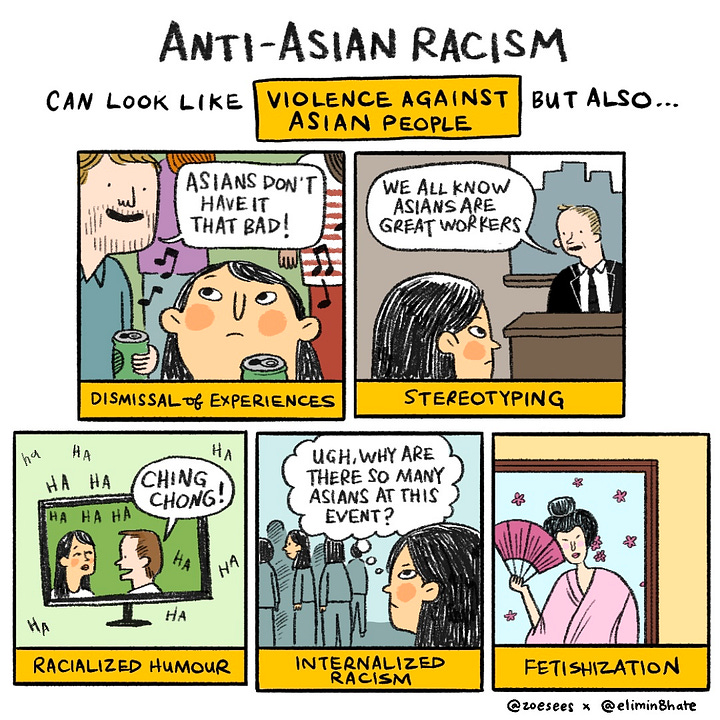
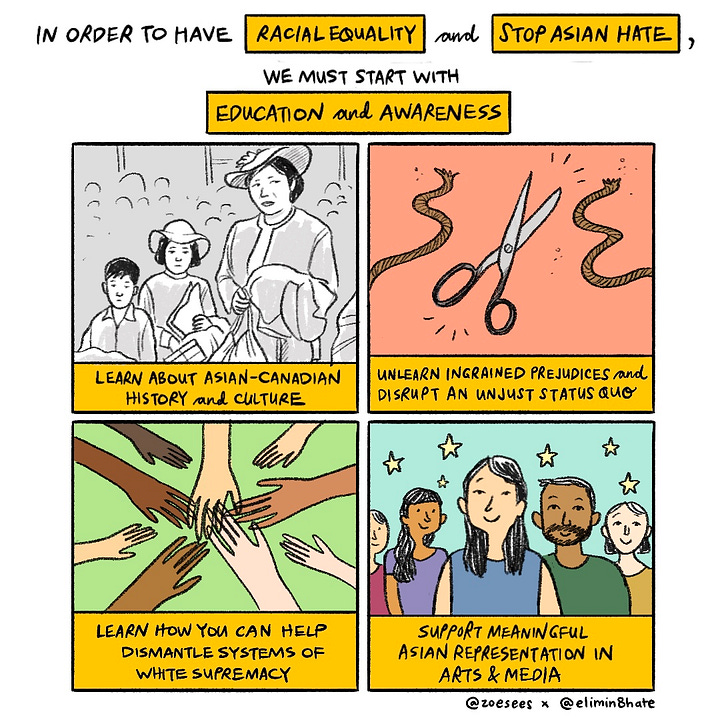
The most divisive thing about it was whether the “stereotyping” of Asians as hardworking was actually a bad thing.
This was unsurprising. Anti-Asian hate crimes are easy to condemn, but the “positive” assumptions made of Asian people under the model minority myth (“MMM”) are often seen as a kindness.
The problem with the MMM is that these assumptions form the ceiling of Asian people’s perceived capabilities. Our self actualization and individual possibility do not matter - we are only valuable to the extent that we fit the mold (as confirmed by this recent study):
Last week, me and three other Asian Canadian artists (Nishant Jain, Kimberley Wong, and Johnny Trinh) were interviewed by the CBC about our experiences with the model minority myth, and how we’re working to dispel it. You can read the article and watch the video here.
I wasn’t as articulate or focused as i’d hoped (very distracted by escalating family crises and also sweating profusely inside of my jean jacket) but the other artists were so wonderfully thoughtful and brilliant. Here are a few of my takeaways (yes I take notes on these things):
The premise of the model minority myth is to pit one culture against the other.
The model minority myth is in tuned with intergenerational trauma and passes through intergenerational cycles. A lot of people’s perception of what it means to be successful is based on the model minority myth, and the roles that have been decided for us of what it means to be Asian.
The roles relegated to Asian people in media are often not as intentional, pivotal or valued, we become part of the ambience that orbits whiteness.
Challenging expectations and realizing what exists beyond the model minority myth is life changing
If we are the ones who benefit from the model minority myth, we have to create spaces where these stories can be amplified, and get those in power to listen and change the systems.
Be not just an ally, but an engaged bystander. When we see each other struggling or succeeding, how to we intervene, or amplify and support?
The model minority myth has manifested as a lifelong struggle to prove myself at every turn, and to become so objectively qualified and impressive that people have no choice but to acknowledge my inherent worth, even if their initial impression is to dismiss me for my appearance. Becoming an artist was never an option, because to become financially unstable, or without social capital, would immediately invalidate me (Asians are only valuable insofar as they are productive!)
Of course, this didn’t work. I was unhappy and unfulfilled as a lawyer, and my accomplishments didn’t change how society perceived me. It’s only in the last couple of years that I have truly grasped the joy and relief of being empowered by POC peers and communities to take up space and be authentically myself, instead of seeking permission to fit into White spaces.
I am just now scraping the surface of what’s possible in my work. I assumed that people would only care to hear my voice if it came with the credibility of also being a lawyer. I never dreamed that the silly cartoons I make for myself would ever be formally recognized for their public service value - and this is just the beginning.
This problem doesn’t end with Asian people - solidarity means ALL communities understanding each other and working together to decolonize our identities and leadership practices. In other words, we aren’t alone and can’t do this alone. This is scary, but it’s also a comfort because it’s FAR less isolating than existing in suspended animation as a failing model minority.
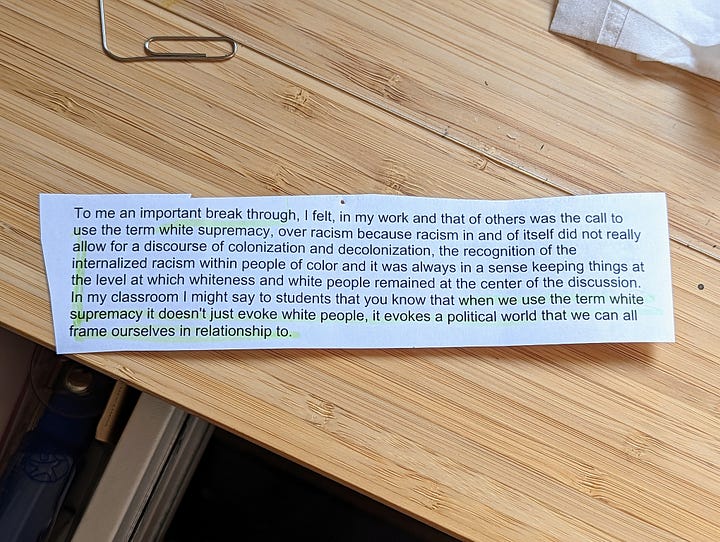
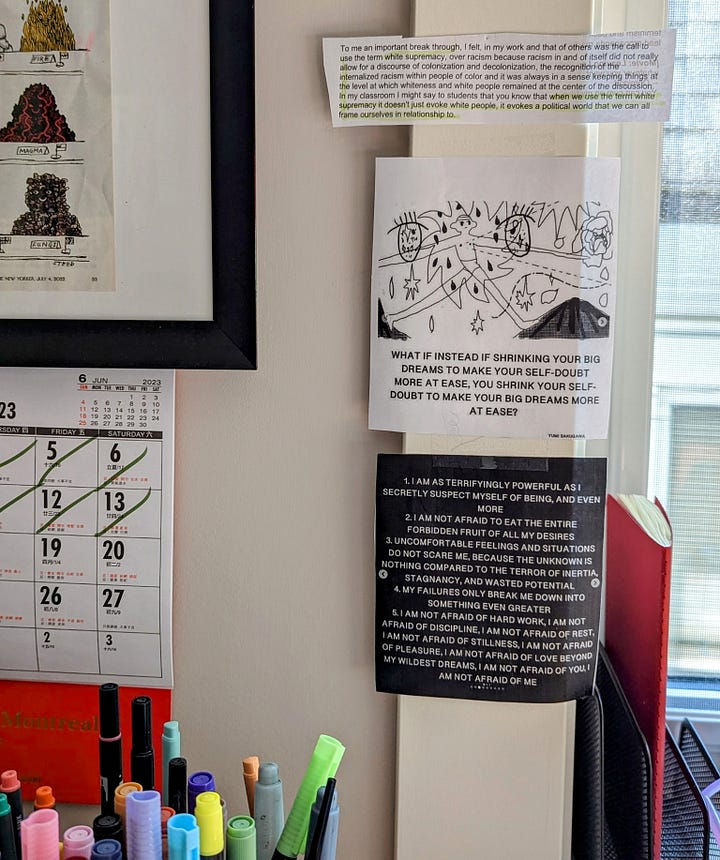
I taped this excerpt from bell hooks’ “Cultural Criticism and Transformation” above my desk (right above my Yumi Sakugawa affirmations, ha) to remind myself that white supremacy exists and permeates all of our psyches and institutions, no matter how much I am guilted into admitting otherwise. It’s something we all need to recognize our relationship to in order to dismantle it. It also provides a definition of white supremacy that even your most defensive white acquaintance might understand, lol (you know who they are)
These past three years have totally transformed me, and my relationship with my culture and with racism. A big part of ~the work~ for me is using my platform to amplify BIPOC folks and tell Asian stories (really just regular stories without ignoring the Asian part). I'm extremely grateful for this opportunity, for my editors, and for the trailblazers who taught me that making space for yourself when others won't is necessary and important.
Happy Asian Heritage Month everyone, i can’t promise this will be my last post about it!
xo Zoe





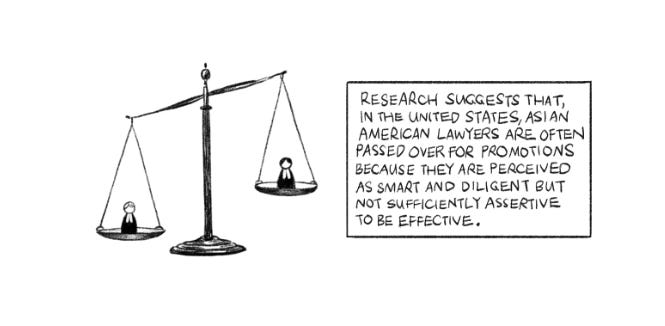


THANK YOU for this post, especially the graphic about Anti-Asian Racism. I remember someone asking me if I ever encountered racism back when I was a kid and I responded that I couldn't really remember much....but I was mainly thinking of direct insults and racist violence. Your graphic showing how there are so many different types of racism reminded me of the times I encountered (from both kids and adults) comments that were basically "oh of course you had high marks, you're Asian", as just one example. LOVE your art style, by the way!
thank you, i love the comics, the summaries, and the reminders at your desk ♥️ as a fellow Asian diaspora person, feel very seen and connected with your work